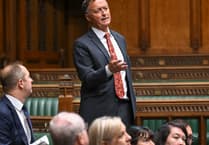The Crown Estate is a strange beast. Classified as a public corporation by the Office for National Statistics (ONS), but run by commissioners more as a private company, its remit is to increase revenue for its beneficiary, the King, who transfers most of the income the Estate generates to the Treasury. Currently, the Crown Estate owns property across the country worth nearly £16 billion and it also owns swathes of the seabed that wrap around our islands.
Last week I was honoured to sit on the Crown Estate Bill committee for legislative scrutiny, conducting a detailed examination of the bill before it begins its third reading, the final reading, before the bill receives royal assent and becomes law.
It's a bill that I have followed very closely because it would enable the Crown Estate to borrow and invest in partnership with our new public energy company, GB Energy. Such a move would benefit Cornwall greatly, especially with our potential for floating offshore wind, because the Crown Estate is the body that sells the leases of the seabed to the developers for the wind turbines. With Falmouth docks and our position in the Celtic Sea, when floating offshore wind is installed nearby, our young people could benefit from good, well-paid jobs in a strong local supply chain. But, it cannot just be left to the market. Without intervention and investment in our ports, businesses and further education, the risk is that those large developers will bring in their supply chains and workers from abroad.
The changes to the powers of the Crown Estate will help enable investment in ports such as Falmouth, the mapping of the seabed, research and development and local supply chains. For example, when Falmouth Marine School was struggling to get funding for a course on floating offshore wind engineering for local 14 to 16-year-olds, the Crown Estate stepped in with one year’s funding to allow it to go ahead on a pilot scale. We need more interventions like this.
It is important that the Crown Estate is held accountable. It is a strange beast. It can also be a force for change: ensuring its deals to rent the seabed for floating offshore wind are done for the public good, not just the highest bidder, who may not work with and for Cornwall.
Change can happen. When I was at Cornwall Council, I helped alter the rules on how the Council spent its money on services and supplies to encourage local contractors who were obliged to give back to Cornwall and use and train local people locally. This work is now going ahead on a national basis and a ‘National Procurement Strategy’ will be published next month.
This government needs to achieve something similar with the Crown Estate if Cornwall is to spearhead the development of offshore renewable energy and lay the groundwork for our future energy security. More importantly, we must build infrastructure, apprenticeships, and supply chains in our local communities, especially when those communities, as we see here in Cornwall, are some of the most left-behind and deprived areas of the UK.





Comments
This article has no comments yet. Be the first to leave a comment.